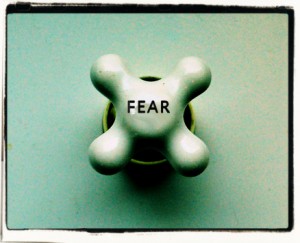 What is Fear? It’s an emotion, a feeling, and although traditionally fear has been despised and fearlessness has been appreciated, I believe fear just like every other emotion has its own purpose in life and hence it should be equally respected. Napoleon Hill, in his 1934 book Think and Grow Rich names six basic fears that hold us back from success: fear of failure, fear of poverty, fear of criticism, fear of old age and ill health, fear of loss of love, fear of unknown and most of us suffer from more than one, rather a mix of these fears.
What is Fear? It’s an emotion, a feeling, and although traditionally fear has been despised and fearlessness has been appreciated, I believe fear just like every other emotion has its own purpose in life and hence it should be equally respected. Napoleon Hill, in his 1934 book Think and Grow Rich names six basic fears that hold us back from success: fear of failure, fear of poverty, fear of criticism, fear of old age and ill health, fear of loss of love, fear of unknown and most of us suffer from more than one, rather a mix of these fears.
I believe fear is good. Fear is good because it means you’re thinking of, moving towards, and considering something unconventional… So in that sense, fear is the first step in the journey you’re about to embark on. Fear is good because it’s an inbuilt threat alert system which helps us filter the bad and dangerous situations and happenings.
Fear is good because it keeps you on your toes and moving. Fear of being hurt or loss or being criticized, consistently keeps you to do better, so that you don’t loose the reputation, the money, the status, etc that you have already built or earned.
Fear is good because it tell you what’s important to you. Think about it, would you be fearful about something you don’t care about. No. This means fear if examined carefully can help you identify what’s important and what is not.
Fear is good, because it keeps your thought process in check. Being bold and aggressive is one thing and being foolish is totally another. Fair amount of fear makes you question yourself, your ideas and the feasibility of your ideas, and questions bring you close to the truth. The truth may scare the crap out of you but, it will also set you free.
Let me give you an example, one of my passions as well as thankfully my profession is to work with aspiring entrepreneurs and I see them struggling with all sorts of fears everyday. I help them question their fears, find if the fears are legitimate or just a negative thought that has blinded their vision temporarily, and if the fears are legit, then find the true reason behind the fear. One of the most powerful questions I ask my clients is if they fell flat on their face while chasing their dreams, worst-case scenario, how long would it take them to recover? How hard would it really be to find another job? The answer mostly is lesser than they originally thought. In fact I’ve never come across anyone who thought it would take them more than a few months to recover. Then I ask them – is the fear of a few tough months strong enough to keep you in a mediocre situation indefinitely? The answer is always – NO.
My point is, do not let your fears overcome your dreams, your passion, your life… Question your fears, find the truth behind those fears and make those fears work for you, not against you. Here are three quick steps to handle fear: Make a list – read out loud: Filter all the non-critical fears or the ones that have no support at all. And for the rest, now you have a clear understanding of the fear and its source. This step helps clearing the noise and identifying the valid and legit fears. Talk to a close friend or coach: The fears left on your list from step 1 above need some talking and brainstorming. Talk to a close friend, a teacher or a coach if you have one because fresh perspectives get us more familiar and acquainted on the issues. In most cases, you would know what needs to be done in order to befriend the fear or totally scratch it out of your list because after the talk and brainstorming you now know that they were also part of noise and not the signal. Burn the boats: Fear of failure disappears when you realize it can’t save you and that failure is not even an option anymore. When success is the only option, you have no choice but to follow through.
Mark Twain once said Courage is resistance to fear, mastery of fear — not absence of fear, which means even the fearless have fear, they just know how to resist and master fears and make them work in their favor. You already have the same fears as they [fearless] do, now all you have to do is master the fears and make them work for you. It is that simple, yet that complicated.
Devesh Dwivedi is an entrepreneur who helps cubicle imprisoned aspiring entrepreneurs break out of the 9 to 5 cubicle jail and start their business.




